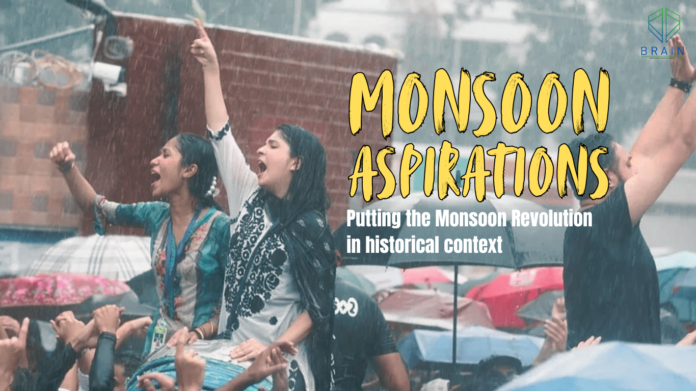- Jyoti Rahman
Monsoons hold a special place in the Bangladeshi psyche. For the urban middle class, it is captured by the 1990 Different Touch song Sraboner meghguli, which mentions books of poems and bougainvillea by the window sill. For the rural folks, it is the embroidering of the nakshi-kantha. For everyone, it is a meal of khichuri and maachh-bhaja. And now we have a new noun related to the season —Srabon Biplob, the Monsoon Revolution.
Those few weeks of July 2024 have changed Bangladesh forever.
But what did the brave young people who faced the bullets of the murderous Hasina regime want? What motivated them to keep standing when the comrade by their side fell to a bullet? What were the aspirations of the Monsoon 2024? Was it just about the
Future historians will be debating this for years and decades to come. But we can look to two seminal events for some clues.
While protests against the reinstatement of the quotas for public service jobs had been gathering pace for days, there was a step change on the night of 14 July. Earlier that day, Sheikh Hasina had ridiculed the protesting students as grandchildren of Razakars.
Razakar had, of course, been used as a derogatory and dehumanizing term in Bangladeshi politics for decades. It was a slur that, once hurled, put the recipients beyond the pale of ordinary political discourse. Razakars were traitors who had no place in the independent Bangladesh, and even murder was justified with the use of this term.
By using the term, Hasina hoped to dismiss the protesters. But it had the opposite effect. Students on various campuses came out that night with the slogan that meant ‘we are all razakars according to the dictator’. Not only did the students reject the demagoguery around the term razakar, but they unequivocally described Hasina accurately as shoirachar —the dictator. Two taboos had been broken, and by the morning, the campuses were free of the thugs and hoodlums of the Chhatra League (BCL).
The events of the night of 14-15 July affirmed a political discourse that rejected the divisive politics grounded in identity markers and historical grievances, as well as the autocratic regime of Sheikh Hasina.
Fast forward to 34 July —that is, 3 August — when Nahid Islam announced the One Point demand, for the end of Hasina’s despotism. Nahid was clear in his speech that the demand was not just for the resignation of a prime minister, but an end to the political ‘system’ that led to such monstrosity in the first place.
Two themes clearly emerge from these seminal events: an inclusive polity that accommodates diversity so that identity markers and historical grievances cannot be used do divide and demonize segments of the society; and the need for constitutional and institutional reforms to strengthen democracy.
These two themes are, of course, the core of BNP’s politics. In articulating his vision of Bangladeshi nationalism, Ziaur Rahman talked about an ‘elbow room’ that accommodates plurality of characteristics, be they ethnic, religious, socioeconomic, or cultural. And BNP has been consistently the party of reform, with the restoration of the multi-party system in 1978 and parliamentary democracy in 1991, and economic reforms under successive governments.
If an end to divisive identity politics and a commitment to reforms are the core aspirations of the Monsoon of 2024, then BNP is a natural vehicle for their realisation.
Nahid is not a member of the BNP. Nor are any of the most well-known youth leaders of the July uprising.
However, students and young people aligned with the BNP’s politics were active throughout the country in July. Waseem Akram was martyred in Chittagong around the same time that Abu Sayeed gave his life in Rangpur. Up to a quarter of the shaheed were affiliated with BNP in some form.
Of course, this should not come as a surprise. All segments of the Bangladeshi society —from the urban working classes to affluent homemakers, across all religious, cultural, ethnic, gender, and generational lines —participated in the Monsoon Revolution. And as the country’s largest political party, it is natural that the BNP was involved intricately in those pivotal weeks.
Going forward, will BNP work towards the realisation of the aspirations of July 2024?
There are two instances in our history where we have seen similarly broad popular participation in political movements: during the anti-colonial struggle that culminated in the end of the British Raj; and during the popular uprising of 1968-69 through to the Liberation War. As the largest political parties of their times, the Muslim League and the Awami League were intricately involved in those ruptures and reaped the political rewards.
It’s the tragedy of our people that both these parties abandoned the aspirations of those events. In the process, those parties have found themselves on the wrong side of history. Their experiences present a cautionary tale for BNP.
For the future of Bangladesh, it is imperative that BNP remains true to its core tenets so that the aspirations of 2024 can be met.

